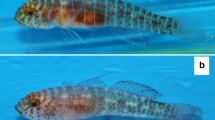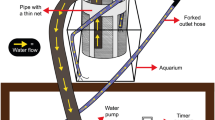Abstract
The sexual behavior of males and the reproductive success of the guppy Poecilia reticulata were studied under experimental conditions in a temperature gradient field of 24–28°С and at a constant temperature of 26°С. The intensity of courtship of males for females in the temperature gradient field was 1.6 times higher than at 26°С, while the structure of male sexual behavior changed: the frequency of manifestation of demonstrative forms of behavior and copulations increased. On average, the individual female fecundity was 19.0% higher in the temperature gradient field than in the constant temperature regime. Temperature fluctuations experienced by fish when exposed to a temperature gradient field had a stimulating effect on the intensity of male courtship and the reproductive success of guppies.


Similar content being viewed by others
REFERENCES
Alba, G., Carrillo, S., Sánchez-Vázquez, F.J., and López-Olmeda, J.F., Combined blue light and daily thermocycles enhance zebrafish growth and development, J. Exp. Zool. A. Ecol. Integr. Physiol., 2022, vol. 337, no. 5, pp. 501–515. https://doi.org/10.1002/jez.2584
Arfah, H., Mariam, S., and Alimuddin, A., Effect of temperature on reproduction and sex ratio of guppy (Poecilia reticulata Peters), J. Akuakultur Indonesia, 2007, vol. 4, no. 1, pp. 1–4. https://doi.org/10.19027/jai.4.1-4
Baerends, G.P., Brouwer, R., and Waterbolk, H.T., Ethological studies on Lebistes reticulatus (Peters). I. An analysis of the male courtship pattern, Behaviour, 1955, vol. 8, no. 4, pp. 249–334. https://doi.org/10.1163/156853955x00238
Bestgen, K.R. and Williams, M.A., Effects of fluctuating and constant temperatures on early development and survival of Colorado squawfish, Trans. Am. Fish. Soc., 1994, vol. 123, no. 4, pp. 574–579. https://doi.org/10.1577/1548-8659(1994)123%3C0574:EO-FACT%3E2.3.CO;2
Clark, E. and Aronson, L.R., Sexual behavior in the guppy, Lebistes reticulatus (Peters), Zoologica, 1951, vol. 36, no. 1, pp. 49–66. https://doi.org/10.5962/p.203475
Deacon, A.E., Ramnarine, I.W., and Magurran, A.E., How reproductive ecology contributes to the spread of a globally invasive fish, PLoS ONE, 2011, vol. 6, no. 9, Article e24416. https://doi.org/10.1371/journal.pone.0024416
Dosen, L.D. and Montgomerie, R., Female size influences mate preferences of male guppies, Ethology, 2004, vol. 110, no. 3, pp. 245–255. https://doi.org/10.1111/j.1439-0310.2004.00965.x
Dzikowski, R., Hulata, G., Karplus, I., and Harpaz, S., Effect of temperature and dietary L-carnitine supplementation on reproductive performance of female guppy (Poecilia reticulata), Aquaculture, 2001, vol. 199, nos. 3–4, pp. 323–332. https://doi.org/10.1016/s0044-8486(01)00561-0
Flerov, B.A., Influence of subtoxic concentrations of phenol on the sexual behavior of guppies, Tr. Inst. Biol. Vnutr. Vod Akad. Nauk SSSR, 1969, vol. 22, no. 19, pp. 66–69.
Golovanov, V.K., Temperaturnye kriterii zhiznedeyatel’nosti presnovodnykh ryb (Temperature Criteria for the Vital Activity of Freshwater Fish), Moscow: Poligraf-Plyus, 2013.
Guevara-Fiore, P. and Endler, J.A., Female receptivity affects subsequent mating effort and mate choice in male guppies, Anim. Behav., 2018, vol. 140, pp. 73–79. https://doi.org/10.1016/j.anbehav.2018.04.007
Herdman, E., Kelly, C., and Godin, J., Male mate choice in the guppy (Poecilia reticulata): Do males prefer larger females as mates?, Ethology, 2004, vol. 110, no. 2, pp. 97–111. https://doi.org/10.1111/j.1439-0310.2003.00960.x
Houde, A.E., Sex, Color, and Mate Choice in Guppies, Princeton: Princeton Univ. Press, 1997.
Johansen, P.H., Female pheromone and the behaviour of male guppies (Poecilia reticulata) in a temperature gradient, Can. J. Zool., 1985, vol. 63, no. 5, pp. 1211–1213. https://doi.org/10.1139/z85-181
Karayucel, S., Orhan, A.K., and Karayucel, S., Effect of temperature on some reproductive parameters of gravid females and growth of newly hatched fry in guppy, Poecilia reticulata (Peters, 1860), J. Anim. Vet. Adv., 2008, vol. 7, no. 10, pp. 1261–1266. https://medwelljournals.com/abstract/?doi=javaa.2008.1261.1266
Karino, K. and Shinjo, S., Female mate preference based on male orange spot patterns in the feral guppy Poecilia reticulata in Japan, Ichthyol. Res., 2004, vol. 51, no. 4, pp. 316–320. https://doi.org/10.1007/s10228-004-0234-6
Konstantinov, A.S., Pushkar’, V.Ya., Zdanovich, V.V., et al., Energy budget of sturgeon juveniles during free swimming in a thermogradient space, Vestn. Mosk. Univ., Ser. 16: Biol., 2004, no. 1, pp. 38–43.
Konstantinov, A.S., Zdanovich, V.V., Pushkar’, V.Ya., et al., Growth and energetics of juvenile sterlet Acipenser ruthenus under optimum stationary thermal conditions and under thermogradient space depending on satiation, J. Ichthyol., 2005, vol. 45, no. 9, pp. 793–798.
Kuznetsov, V.A., Zdanovich, V.V., Lobachev, E.A., and Lukiyanov, S.V., On the issue of astatic ecological optimum, Usp. Sovrem. Biol., 2015, vol. 135, no. 5, pp. 437–452.
Laudien, H. and Schlieker, V., Temperature dependence of courtship behaviour in the male guppy, J. Therm. Biol., 1981, vol. 6, no. 4, pp. 307–314. https://doi.org/10.1016/0306-4565(81)90019-X
Magurran, A.E., Seghers, B.H., Shaw, P.W., and Carvalho, G.R., The behavioral diversity and evolution of guppy, Poecilia reticulata, populations in Trinidad, Adv. Stud. Behav., 1995, vol. 24, pp. 155–202. https://doi.org/10.1016/S0065-3454(08)60394-0
Muñoz, N.J., Breckels, R.D., and Neff, B.D., The metabolic, locomotor and sex-dependent effects of elevated temperature on Trinidadian guppies: Limited capacity for acclimation, J. Exp. Biol., 2012, vol. 215, no. 19, pp. 3436–3441. https://doi.org/10.1242/jeb.070391
Nazarova, A.V. and Kreslavskii, A.G., Comparison of sexual behavior of males of guppy Poecilia reticulata of different origin, J. Ichthyol., 2000, vol. 40, no. 2, pp. 191–196.
Ogilvie, D.M. and Fryer, J.N., Effect of sodium pentobarbital on the temperature selection response of guppies (Poecilia reticulata), Can. J. Zool., 1971, vol. 49, no. 6, pp. 949–951. https://doi.org/10.1139/z71-139
Ohlyan, S., Sihag, R.C., and Yadava, N.K., Courtship behaviour and mate choice in guppies: Tactics and strategies, J. Nat. Sci. Sustain. Technol., 2012, vol. 6, no. 3, pp. 151–167.
Pilastro, A., Simonato, M., Bisazza, A., and Evans, J.P., Cryptic female preference for colorful males in guppies, Evolution, 2004, vol. 58, no. 3, pp. 665–669.
Reeve, A.J., Ojanguren, A.F., Deacon, A., et al., Interplay of temperature and light influences wild guppy (Poecilia reticulata) daily reproductive activity, Biol. J. Linn. Soc., 2014, vol. 111, no. 3, pp. 511–520. https://doi.org/10.1111/bij.12217
Shah, T.K., Saini, V.P., Ojha, M.L., and Raveender, B., Effect of temperature on growth and survival of guppy (Poecilia reticulata), J. Exp. Zool. India, 2017, vol. 20, no. 1, pp. 505–510.
Williams, E.E. and Brauer, R.W., Thermoregulatory behavior and temperature gradient perception in a juvenile fish (Poecilia reticulata), Can. J. Physiol. Pharmacol., 1987, vol. 65, no. 6, pp. 1389–1394. https://doi.org/10.1139/y87-218
Žák, J. and Reichard, M., Fluctuating temperatures extend median lifespan, improve reproduction and reduce growth in turquoise killifish, Exp. Gerontol., 2020, vol. 140, Article 111073. https://doi.org/10.1016/j.exger.2020.111073
Zdanovich, V.V., Aver’yanova, O.V., and Pushkar’, V.Ya., Embryonic-larval development of the weatherfish Misgurnus fossilis at constant and periodically changing temperatures, Vestn. Mosk. Univ., Ser. 16: Biol., 2001, no. 2, pp. 41–45.
Author information
Authors and Affiliations
Corresponding author
Ethics declarations
Conflict of interests. The author declares that he has no conflicts of interest.
Statement on the welfare of animals. All applicable international, national, and/or institutional guidelines for the care and use of animals were followed.
Additional information
Translated by D. Martynova
Rights and permissions
About this article
Cite this article
Zdanovich, V.V. Sexual Behavior and Reproductive Success of Guppy Poecillia reticulata (Poeciliidae) at a Constant Temperature and in the Temperature Gradient Field. J. Ichthyol. 63, 969–974 (2023). https://doi.org/10.1134/S0032945223050168
Received:
Revised:
Accepted:
Published:
Issue Date:
DOI: https://doi.org/10.1134/S0032945223050168




